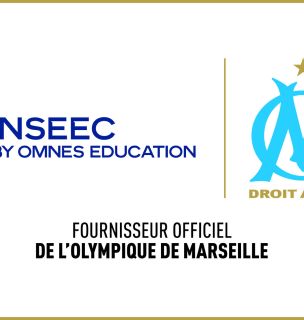There is a wide range of opportunities in the industry for candidates with dual marketing and sales profiles.
The MSc Taxation, Business Law, Consulting and Business Management : training experts in business law and taxation
“The business law and tax professions are the backbone of a company’s development and are not suffering from any decline in attractiveness.
The business and tax law sector is currently experiencing a boom but also an unprecedented change due in particular to the internalisation of trade, the predominance of the anglophone business model and a strong demand for qualified candidates. Moreover, a business lawyer has to keep in mind not only the clients’ ever-increasing desire to rationalize costs, but also intensifying competition.
Therefore, legal professionals are no longer only providers of legal services but must rely on their skills, help adapt fiscal governance, going beyond legal issues. “
Ellen KOUNTZ, Programme Director

A 1 or 2 year degree to become an expert in corporate law and taxation
Holders of a three-year bachelor’s degree can apply for the first year of the MSc, and holders of a four-year bachelor’s degree can apply directly for the second year.
The objectives
The “Expert in Audit, Control & Consulting” certification is designed to meet the changing skills needs of the finance sector. The evolution of these skills stems from changes in the activities and professions of the finance sector: stricter regulatory environment as well as an increase in the volume of data to be processed and analyzed, digitalization, use of technology, professional standards and competition.
Targeted Activities :
- Steering and overseeing company performance
- Manage controls and conduct audits
- Advice and information on taxation and business law
- Lead teams in the context of an audit and performance analysis mission
How to apply to the MSc Taxation, Business Law, Consulting & Management at INSEEC?
The required prerequisites
The conditions for accessing the certification system (excluding VAE) are:
- For entry into the 1st year of the course (MSc 1): to have validated 180 ECTS (level 6, License or equivalent) in the field of marketing, commerce, management or communications. He must have a professional level of English for the English-speaking program.
- For entry into the 2nd year of the course (MSc 2): to have validated 240 ECTS (level 6, Master 1 or equivalent) in the field of marketing. He must have a professional level of English for the English-speaking program.
- Executive training is subject to specific prerequisites with professional experience taken into account.
Would you like to know more about the MSc in Taxation, Business Law, Consulting & Management ?
Sign up for an Open Day!
Would you like to know more about the admission conditions for our programme in Taxation, Business Law, Consulting & Management ?
Courses
The courses presented below are given as an example, they may vary slightly depending on the teaching campus. The course content is adapted each year to market developments and updated before the start of each new school year.
1st year courses
PROFESSIONAL METHODS AND PRACTICES – 1ST YEAR
Business Game
The business game is played using a business simulator. Groups of students are responsible for running a business in real time. All major business functions are covered. Students will make decisions to maximize the profitability of the business.
Professional Technical Workshops and Personal Management
- CV writing, recruitment interview techniques for the search for an internship, professional project management, team management and meeting management.
- Negotiation techniques, transactional analysis and NLP, public speaking and stage fright management, management and leadership techniques (Praditus).
- Skills assessment, coaching, digitization of the CV and job search techniques at national and international level, preparation for the defence of the applied research thesis.
Business conferences
Presentation of the jobs in the sector by professionals.
CROSS-CUTTING AND FUNDAMENTAL COURSES
Budget management and control panels
The objective is to acquire key skills in terms of budget management and reporting. The focus will be on budget architecture, with the implementation of summary documents, project management control and its link with budget management, and the creation and steering of performance indicators.
Business plan and company creation
The objective of this module is to learn how to draw up a business plan: Designing a costed project for the creation or development of a company.
Several steps are covered: feasibility study, market targeting, opportunities and risks, strengths and weaknesses, communication, financing plan and profitability.
Negotiation
This seminar focuses on a negotiation in a national and international context.
In particular, it will account for the impact of culture on an international negotiation. The national negotiation will focus on the sales process through role playing.
English
Perfect English language comprehension and communication skills in a wider context than just business English. Students are required to take the TOEIC test.
Management Information Systems
This module aims to deepen students’ skills in IT to meet the needs of companies in terms of budgetary or commercial monitoring, project management, personnel management and communication: Excel, Word, Powerpoint, teamwork tools, business software.
It aims to be efficient with office automation tools, identify and correct errors quickly, customize existing tools or create your own tools.
SPECIALIZED COURSES
Control
Break-even point and how to calculate it.
Budget management techniques, activity management and dashboards.
Analysis and use of management control, costing methods, analysis centre methods, fixed costs allocation, marginal costing, partial costing.
Audit and statutory accounting
The seminar covers the auditing of accounts as well as audit procedures, tests, methods and tools. Introduction to the legal audit, fundamentals and how to conduct an audit, assessment of internal control, specific checks and summary reports.
Procedures for analysis, control of tangible assets, management statements
Advanced accounting
Mastery of the accounting procedure; consolidation of accounts; allocation of results; reduction of capital; valuation of securities; incorporation of companies; increase in capital; convergence of PCG with IFRS standards.
Financial analysis
Financial analysis.
Modern diagnostic tools.
Restatements to correct errors.
Tools for financial diagnostics: profitability analysis, solvency and financial structure of the company.
Investment policy. The financial structure of the company and financial policies.
International financial statements
Presentation of IFRS, US GAAP.
Organization of the accounting framework, the conceptual framework of standards, presenting financial statements under IFRS/US GAAP.
Measurement and recognition of financial instruments.
Business and tax law
Definition of business law. The concept of contract.
The different types of obligation: obligation of means and obligation of result.
The concept of legal personality, the functioning of private and public limited companies and general partnerships (SARL, SA, SNC).
Criteria for choosing a business structure.
The role and powers of the supervisory and management bodies.
The principles and applications of corporate taxation. Tax optimization of a group.
International taxation. VAT: principles and mechanisms.
Special VAT regimes. The territoriality of VAT: the rules of territorial taxation, the deliveries of movable goods, the supply of services. The VAT due: The basis of VAT and how to calculate it.
Corporate Finance
Investment projects: selection criteria and real options approach.
Financing methods: quasi-equity, bond financing, negotiable debt securities, initial public offering, venture capital. Explanatory theories of financing choice.
Treasury and management of centralized flows.
2nd year courses
PROFESSIONAL METHODS AND PRACTICES – 2ND YEAR
Professional technical workshops and personal management
CV writing, recruitment interview techniques for the search for an internship, professional project management, team management and meeting management.
Negotiation techniques, transactional analysis and NLP, speaking and stage fright management, management techniques and leadership.
Skills assessment, coaching, digitization of the CV and job search techniques at national and international level, preparation for the defence of the applied research thesis.
Computerized management tools
Software (excel, word, VBA, professional software).
Business conferences
Presentation of the jobs in the sector by professionals.
Finance
Corporate governance and strategy
This course covers the company’s strategic approach in order to understand and anticipate its long-term development. Perform a comprehensive diagnostic of the company and its environment, assessing its ability to cope with and adapt to change, analyze and understand the structural issues involved in implementing a strategic plan; understand an organization’s identity and analyze the components of a company’s culture.
Accounting
This general course covers accounting fundamentals and studies the different steps in depth: mobilization of receivables; bank reconciliations; inventory entries.
Financial analysis
Intermediate management balances; cash flow statements; writing and analysis of tax returns.
International accounting standards
This course covers the specifics of US GAAP. Readings and analysis based on case studies.
Communication management
This seminar aims to teach students how to structure and transmit a message to communicate effectively. It also covers good listening practices, interview preparations and how to conduct meetings.
Budget management and dashboard reporting
The aim of this course is to acquire key knowledge in budget management and reporting. The focus will be on structuring budgets, making use of summary documents, project controls as they relate to budget management and the creation and steering of performance indicators.
Business law
Corporate law
This course provides a practical approach to the legal structures of companies. The aim is clear: to know how to choose the appropriate company, to set up the company and the legal secretariat, to master the legal, fiscal and social aspects of the creation and operation of the company.
In particular, the liberalisation of the joint-stock company (SAS) by the economic modernisation law (LME), offers many advantages that must be seized. The objective of this course is also to understand the interests of the company, and the choice of the legal structure via the study of the principal arrangements (holding, LBO, SCI).
Financing law
Whatever the method of financing (capital increase, loan, APE, self-financing, etc.), investment operations entail numerous legal constraints that must be covered by appropriate tools (shareholders’ agreements, guarantee clauses, etc.).
Contract law and techniques
This course provides a practical understanding of contract law – both the general theory and the special regimes. The drafting of the GTC and the usefulness of distribution contracts (franchise, management-agent) are particularly highlighted. This course provides a practical understanding of contract law – both the general theory and the special regimes. The drafting of the GTC and the usefulness of distribution contracts (franchise, management-agent) are particularly highlighted. Beyond the knowledge of the particular legal regimes of the contractual clauses, it is the regulation of commercial relations (B to B and B to C). The essential thing for the drafter is to know how to take advantage of a suppletive framework. Other developments will be devoted to industrial contracts and commercial leases.
. The essential thing for the drafter is to know how to take advantage of a suppletive framework. Time will also be spent on to industrial contracts and commercial leases.
European business law
This course is aimed at training students to anticipate the impact of law on their European business activities. Attention will be focused on European institutions. Legal principles will be analyzed in terms of their foundations in social policy and their practical applications in business relations.
Arbitration and mediation law
Arbitration has become an ordinary mode of dispute resolution in domestic and international law.
France, like many countries, has introduced flexible and liberal solutions to settle international trade disputes in a manner consistent with the will of the parties.
As much as possible, the course presents domestic and international arbitration law side-by-side. The course also examines solutions to the main issues raised by any arbitration procedure: validity of the arbitration agreement, formation of the arbitral tribunal, procedure before the arbitrators, law applicable to the merits, overturning and enforcement of sentences.
Corporate intangible assets law
Intellectual property law: literary and artistic property (copyrights) and industrial property (patents, designs and trademarks) are the heart of a company’s intangible assets and need protecting. This seminar offers students the keys to understanding the subject with a grounding in the practicalities (e.g. how to file a trademark).
IT law: IT is nowadays omnipresent in the company. The aim is to identify the legal risks linked to its use in order to limit its effects (internet charter, files, inbox, data protection law, data collection and processing, etc.).
Mergers and acquisitions
This course will cover the market for changes of ownership of companies (small and midcap) and how to organize a merger operation, including the various parties, from both legal and fiscal points of view (business valuation).
Taxation
Group taxation
The course deals with the different aspects of group taxation: dividend distribution, tax optimization within a group, the notion of deferred taxation. Tax integration (horizontal, parent-subsidiary regime, etc.).
Corporate taxation
This seminar addresses the principles applicable in domestic law. VAT (intra-Community, domestic transactions, territorial applications). It will also address the guarantees and means of recourse available to the taxpayer (tax litigation).
International taxation
The aim is to set out and study the constraints and opportunities in terms of income tax/corporate tax, methods of tax evasion, the response of the tax authorities, the impact of tax treaties and to establish an overview of tax havens.
Personal taxation
The purpose of this course is to define the taxation of assets and investments linked to ownership (IFI) and income (property income, personal capital income, inheritance and gift tax).
Business english and legal environment
Grand Oral in English based on contemporary debates. The different models of capitalism, growth, technological change and employment, knowledge and intangible economies, networks, territories and competitiveness clusters.
2 start dates per year and varying study formats
There are two openings per year, in February/March and September/October. To check the enrolment availability, contact the admissions department directly.
The pace of the courses may differ depending on the campus and whether the training is carried out under an internship agreement (full-time study) or a professionalization/apprenticeship contract (continuing education).
The work-study contract must be signed for a period of 12 months (MSc 2), 24 months (MSc1 + MSc 2) or 18 months for the staggered start in March (continuation of studies in MSc2).

Career opportunities after an MSc in Taxation, Business Law, Consulting & Business Management
- Management Controller
- Financial Auditor / Auditor
- Accounting Consultant / Finance Consultant / Management Consultant
- Accounting Manager
- Banking & Tax Lawyer / Financial Markets Lawyer
Professional certification of ” The Expert in Audit, Control & Consulting certification is a level 7 title (EU) diploma”, NSF codes 313 and 314, awarded by INSEEC and IFG (INSEEC EXECUTIVE EDUCATION, CEERA, CEESO, MBA INSTITUTE, CEFAS and IFG), registered under number 35008 in the French National Directory of Professional Certifications (RNCP) by decision of France Compétences on October 14, 2020.
The certification is awarded by completing all skills blocks in their entirety. Every skill in a block must be acquired in order to earn the block; partially complete blocks do not count. It is also possible to obtain the certification through Validation of Acquired Experience (VAE).
Find the skills blocks for this RNCP title by clicking here.
What are the teaching methods?
Teaching methods
- Lectures and interactive courses
- Situational exercises through collective or individual case studies carried out by the students
- Conferences, seminars and educational visits
Evaluation methods
- Individual or group case studies
- Individual and group oral presentations
- Individual and group files
Methods and tools
- The evaluation methods are in person, in the form of continuous assessment or final written exams.
What is the 2025/2026 tuition to enter the program?
SPRING INTAKE – 2025
Full-time studies:
- MSc1 : €11,400
- MSc2 : €12,950
Continuing education (sandwich course) :
- 24 months : €22,850 before tax
- MSc2 : €13,650 before tax
FALL INTAKE – 2025
Initial training:
- MSc1 : 11 850 €
- MSc2 : 13 500 €
Continuing education (sandwich course) :
- 24 months : 23 850 € HT
- MSc2 : 24 250 € HT
VAE/VAP :
- VAE : €4,200 before tax
- VAP : €850 before tax
International students pack: Mandatory fee of €490 for exclusive support services international students.
What kind of financial aid is available?
INSEEC offers several financial aid schemes:
- The alternating rhythm, in internship or work-study contract
- The right to training via the CPF
- Partnerships with banking institutions referenced at INSEEC
Key figures for the MSc in Taxation, Business Law, Consulting and Management
85%
Overall satisfaction with training – Class 2022
94%
Success rate – Class 2023
86%
Employability rate – Class 2023
97%
Presentation rate – Class 2023
Disabilities
The OMNES Education Group pays particular attention to the societal environment, including the disability dimension. Indeed, we believe that students with disabilities should not have any problems in pursuing their studies and starting a professional career. We accompany them to facilitate their access to the premises, offer them personalized advice as well as adapted accommodations throughout their school career.
Accessibility of premises: all our campuses are accessible to people with disabilities.
To learn more about the OMNES Education Group’s disability policy, click here.
Contacts for disability referents by campus:
Bordeaux : Maxime DOUENS – mdouens@inseec.com
Lyon : Anissa GASMI – agasmi@inseec.com
Rennes : Laura LE CALVEZ – llecalvez@omneseducation.com
Paris : Farid HAMAD – fhamad@inseec.com
Chambéry : Clément BERTACCO – cbertacco@inseec.com
Marseille : Océane VALOTTI – ovalotti@omneseducation.com
News

June 2024
INSEEC hosted the CFNews Grands Prix de la Croissance Externe Sud Ouest for the second year running
Read more





